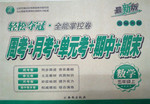题目内容
The patient insisted that he ________ ill and ________ to the hospital.
A. wasn’t, wasn’t sent
B. wasn’t, shouldn’t be sent
C. shouldn’t be, wasn’t sent
D. shouldn’t be, shouldn’t be sent
练习册系列答案
 轻松夺冠全能掌控卷系列答案
轻松夺冠全能掌控卷系列答案
相关题目
题目内容
The patient insisted that he ________ ill and ________ to the hospital.
A. wasn’t, wasn’t sent
B. wasn’t, shouldn’t be sent
C. shouldn’t be, wasn’t sent
D. shouldn’t be, shouldn’t be sent
 轻松夺冠全能掌控卷系列答案
轻松夺冠全能掌控卷系列答案